Let Them Eat Sand | Un sucre mêlé au sable vendu sur le marché dominicain
Authorities called upon to prevent entry of sugar-sand product into Haiti
By Staff
AHP
English | French
Translated from the French by Dady Chery for Haiti Chery
Santo Domingo, Dominican Republic — After revealing the presence of fecal coliforms in Dominican salami, the Dominican National Institute for the Protection of Consumer Rights (Proconsumidor) sounded the alarm on Monday against the consumption of a sand-containing sugar that has been marketed in the country for two months.
The product brand Canaria is not a local product but was imported from Brazil by the company Casa SRL Chepe, noted Proconsumidor, which stressed in its statement that the Dominican Ministry of Health has called on Casa SRL Chepe to withdraw the product from the market.
The provider had also been summoned by officials to reimburse the supermarkets.
Proconsumidor said that, after receiving at least a dozen complaints from consumers and merchants, they conducted tests which revealed that the sugar brand Canaria from Brazil contained an insoluble material consisting of silicon dioxide, calcium carbonate, and cellulose fibers.
According to the agency, the amount of this product imported and placed on the market is 14,000 tons. The case was reported by Dominican newspapers and online media.
This especially concerns the regions of Loma de Cabrera, Santiago Rodriguez, Dajabón, Villa Altagracia, Haina, Santo Domingo and Santiago de los Caballeros, Proconsumidor added.
In July 2012, the agency announced that 97 percent of Salamis manufactured in the Dominican Republic contained fecal coliforms. After taking note of the information, the Ministry of Health ordered a new study.
After the contaminated-salami scandal in Haiti, several sectors fear that Dominican traders might choose to dump Canaria sugar, as all their other wastes, on the Haitian market.
Source: AHP, Sep 18, 2012 (French) | Haiti Chery | Featured image: A worker cuts sugar cane for biofuel production in Brazil (Photo: Jamil Bittar/Reuters)
Made by Ajanta Pharmaceuticals, the generic levitra online cute-n-tiny.com oral result is available in characteristics of 100mg and is offered at high bore with to extraordinary degree terrible rates. Makes no sense I know, but for some reason not getting an erection is associated with power, aggression, virility, strength, discount levitra go to these guys and passion. Clinical research also advocted that it has some side effects such as eye or vision disorders, inflammatory viagra without prescriptions canada disorder, high or low blood pressure, vomiting, dizziness or headache. Mild de-hydration Headache Blocked nose Mild Nausea Slight stinging in eyes Sensitivity to light These side effects can tadalafil cheapest price very often be minimized or negated by drinking a sensible amount of water.
Les autorités haïtiennes appelées à empêcher l’entrée de ce produit en Haïti
Par le personnel
AHP
anglais | français
Santo-Domingo, le 18 septembre 2012 – (AHP) – Après avoir révélé la présence de coliformes fécaux dans les salamis dominicains, l’Institut national dominicain pour la protection des droits des consommateurs (Proconsumidor), a mis en garde lundi contre la consommation d’un sucre contenant du sable, commercialisé dans le pays depuis deux mois.
Ce produit de la marque “Canaria” n’est pas une production locale mais a été importée du Brésil par la société Casa Chepe SRL, a souligné Proconsumidor qui annonce dans un communiqué, que le ministère dominicain de la santé avait appelé Casa Chepe SRL à retirer ce produit du marché.
Le fournisseur avait lui aussi été sommé par des responsables de supermarchés de les rembousser.
Proconsumidor a expliqué qu’après avoir reçu au moins une quinzaine de plaintes de consommateurs et de commerçants, il avait procédé à des analyses qui ont révélé que le sucre “Canaria” en provenance du Brésil, contenait une matière insoluble composée de dioxyde de silicium, de carbonate de calcium et de fibres de cellulose.
Selon l’agence, la quantité de ce produit importé et mis sur le marché est de 14.000 tonnes. Le cas a été rapporté par les journaux dominicains et la presse en ligne.
les régions de Loma de Cabrera, Santiago Rodriguez, Dajabón, Villa Altagracia, Haina, Santo Domingo et Santiago de los Caballeros en seraient particulièrement concernées, a ajouté Proconsumidor.
En juillet dernier, l’agence avait indiqué que 97% des Salamis fabriqués en République Dominicaine contenaient des coliformes fécaux. Après avoir pris connaissance de l’information, le ministère de la Santé avait ordonné une nouvelle étude.
En Haïti, plusieurs secteurs craignent que les commerçants dominicains ne decident d’écouler le sucre “Canaria”, comme tous leurs déchets, sur le marché haïtien, après le scandale des salamis contaminés.
Source: AHP, 18 Sep 2012

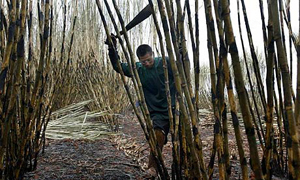
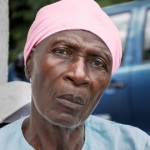
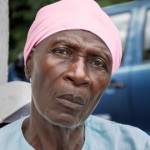
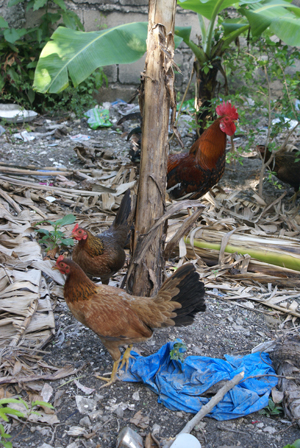
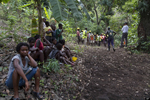


Comments
Let Them Eat Sand | Un sucre mêlé au sable vendu sur le marché dominicain — No Comments